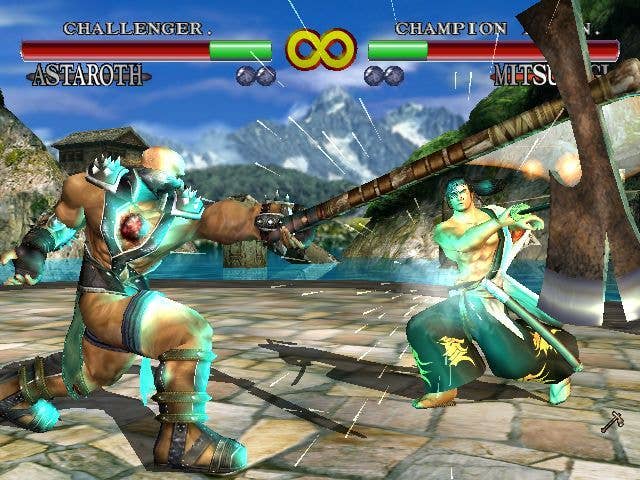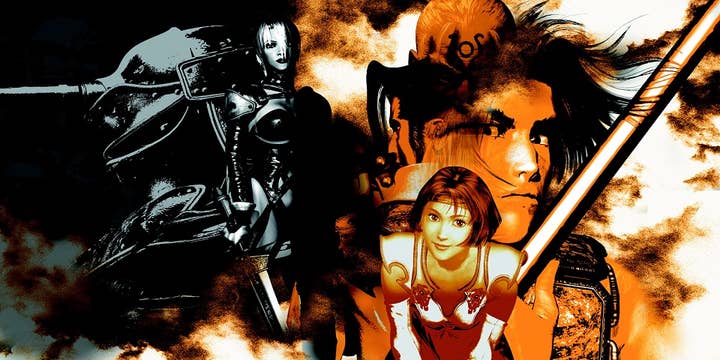The Soulcalibur still burns | Why I Love
Namco's Dreamcast fighter ushered in the era of better-than-arcade ports and built friendships in competitive communities that last to this day
Why I Love is a series of guest editorials on GamesIndustry.biz intended to showcase the ways in which game developers appreciate each other's work. This entry was contributed by Andrew Alfonso, localization director at Capcom.
When people talk about Soulcalibur, they talk about characters, the cool weapons, the iconic announcer, the animation - oh god, the animation.
But you know what Soulcalibur was above all of that? It was the game changer. It heralded the arrival of console games that were more than arcade-perfect, they were better-than-arcade. I was lucky enough to have an arcade close enough to me where I could drop in and play Soulcalibur, but the Dreamcast version was like playing something from the future.
Even today, it's still the highest rated fighting game of all time and one of the few fighting games consistently in the discussion when it comes talking about the best games ever made. For me, the series holds a special place in my heart because it was the spark that helped ignite my career, and earned me lifelong friends.
Like other gamers, Street Fighter 2 was my first brush with a fighting game, and like everyone else, I would put my quarter on the dash and wait my turn. And like everyone else, I'd get demolished by the local champ and move to the back of the line. That never deterred me from playing, and with time I got good enough to scrap a win here and there.
Eventually the game made its way to the Super Nintendo, which let me practice as much as I wanted. I combed through strategy guides from GamePro and read about all the tournaments, and I kept experimenting with characters I never had the courage to touch in the arcade.
But I slowly realized that I wasn't as good as I wanted to be. I read and practiced every single combo I could, but doing them in a match when it mattered never happened with any consistency. I kind of had to live with the fact that I was good enough to beat my friends, but not good enough to compete against the best.
"I remember being shocked when I first played Soulcalibur. The game was beautiful in motion, everything had a flow to it, and it was fast"
Fast forward a couple of years and I had a friend raving about an upcoming arcade fighter called Soulcalibur. He touted the guard impact system and the ability to avoid combos via air control as revolutionary mechanics, although I didn't believe him at the time. Still, the game looked cool, so we decided to drive down to the arcade and give it a shot.
I remember being shocked when I first played Soulcalibur. The game was beautiful in motion, everything had a flow to it, and it was fast. And the most important thing was that outside of a few attacks, nothing required more than a couple of directional presses. It was easy to get into but still had enough depth to make it fun to experiment with characters. Even though guard impacts required a bit of timing, they were still lenient enough that any beginner could take advantage of it.
It was Soulcalibur that rekindled my love for fighting games, and helped me understand how fighting games work. I found that I had a much better understanding of how to play a fighting game thanks to the more forgiving learning curve. Still, I wouldn't say that I was amazing at the game, but I understood the reasons behind my wins and losses much better.

My first E3 was in 1999, and as luck would have it, there was a Soulcalibur tournament. I ended up winning the tournament, and after my win, I had IGN's strategy guide editor-in-chief at the time approach me with an offer to write freelance for them. I started juggling school and freelance work, and after I graduated, I moved to Japan for work, but I continued my freelance work with IGN. This helped me get the exposure I needed to land a job with Capcom's localization team. It was thanks to Soulcalibur that I'm in the industry now, but that's not all it did for me. (Quick tangent: I had the pleasure of recording with the original Soulcalibur announcer for a small promotional project at Capcom. It was surreal!)
Soulcalibur had never been the most popular game in the competitive scene, but it had its enthusiastic audience, and in Toronto where I was born, the scene blossomed with the release of Soulcalibur 2. Its arcade release, much like the original, didn't have huge hype behind it, but the legacy of the Dreamcast game gave the sequel a bit more buzz. It also helped that Namco put more effort into promoting tournaments for it, and it had a cool Conquest mode for people not interested in competitive play.
"It wasn't uncommon to see crowds of 10-20 people huddled around a single Soulcalibur 2 machine, waiting for their turn"
I was one of the original Soulcalibur arcade players in Toronto, and I decided to organize Soulcalibur 2 tournaments at the now defunct Downtown Funland, just because I wanted more people to play against. A couple of months passed and the crowds for the game kept getting bigger. Our scene grew, we were getting a reputation, and we even had a group from the US driving across the border just to invade our tournaments! It wasn't uncommon to see crowds of 10-20 people huddled around a single Soulcalibur 2 machine, waiting for their turn.
When the console versions were released, arcades were still the place for tournaments, but that eventually changed with the times. That turned out to be a great catalyst for our scene's growth, however. We had more players joining our scene, no longer afraid of losing money at the arcade, and more scenes popped up across Canada thanks to the accessibility of the console versions. The newly-formed Montreal scene extended an invitation to us to join their tournament, and that led to one of their top players inviting us to represent Canada at the World Game Cup in France in 2003. While I didn't make it out of my pools in singles competition, our team tied for 3rd in the team tournament, which was huge for us. That led to one of our own players traveling to Evo 2004, fully funded by our scene, and placing in the top 3 for Soulcalibur 2.
When our Soulcalibur scene started, we didn't even know each other's names. Acknowledgment was just a head nod at best. But the game brought us together and helped us create friendships that still last to this day.
It's been nearly two decades since the release of Soulcalibur 2, and the people who were around to found the scene are scattered all over the world. A couple of us are in Korea, some in China, and I'm in Japan. Most of the community is still in Toronto but aren't in the downtown core anymore. But whenever we get together, we can still talk about those days at Downtown Funland when I got a 40-win streak using one cheap ass Cassandra combo, or when a soon-to-be top player nearly broke the cabinet by punching it.
Soulcalibur was just a game that we could play together and have fun, but special games like that do more. They help create memories and friendships that'll last a lifetime.
Developers interested in contributing their own Why I Love column are encouraged to reach out to us at news@gamesindustry.biz.









